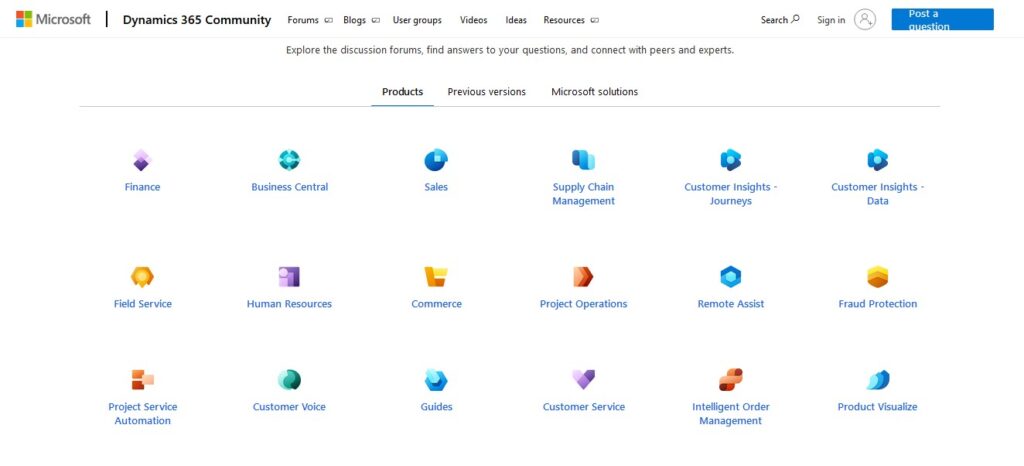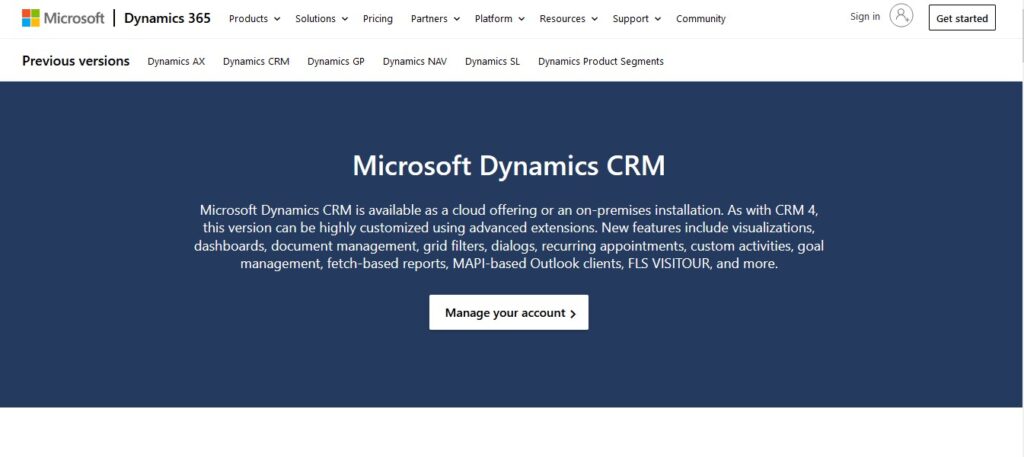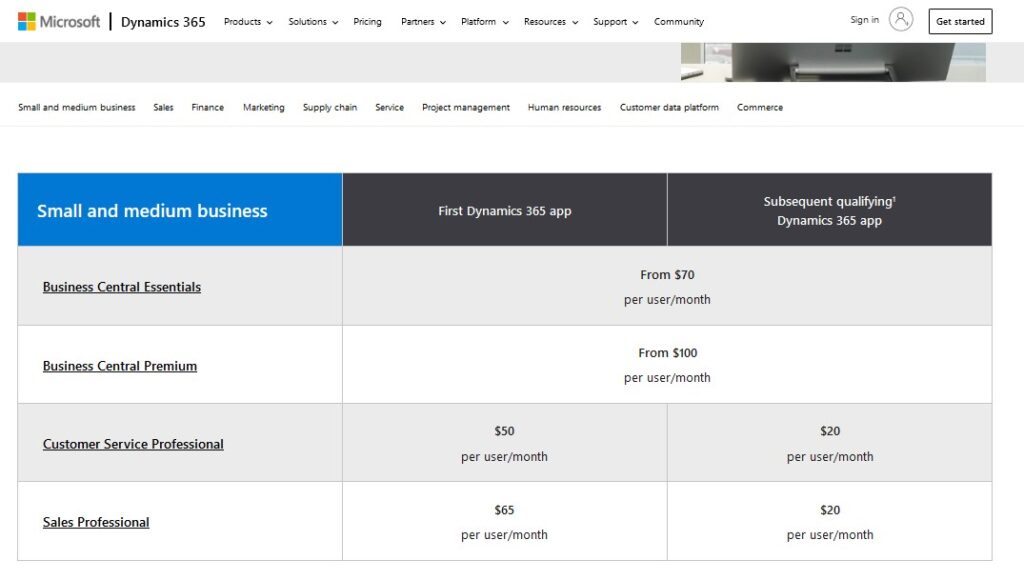Dynamics 365 is a comprehensive suite of business applications offered by Microsoft, including a powerful CRM (Customer Relationship Management) tool. Its pricing structure is designed to be flexible and scalable, with options for standalone applications or bundled plans. The subscription-based pricing model allows businesses to only pay for the features they need, making it an attractive option for companies of all sizes. Plus, with the ability to add or remove users as needed, Dynamics 365 offers a cost-effective solution that can adapt to changing business requirements.
In terms of features, Dynamics 365 CRM boasts a wide range of capabilities designed to streamline sales processes, improve customer service, and enhance marketing efforts. From lead management and pipeline tracking to advanced analytics and AI-driven insights, the platform equips businesses with the tools they need to build strong customer relationships and drive growth. User reviews of Dynamics 365 often highlight its user-friendly interface, seamless integration with other Microsoft tools such as Office 365 and Power BI, as well as its robust customization options. Businesses appreciate the flexibility and scalability offered by Dynamics 365 CRM while noting its potential for driving efficiency and productivity across their organizations.
For those seeking alternatives to Dynamics 365 CRM, several competitive options exist in the market. Salesforce CRM stands out as a leading alternative known for its extensive customization capabilities and robust ecosystem of third-party integrations. Zoho CRM is another popular choice offering a user-friendly interface and affordable pricing plans suitable for small businesses.
Dynamics 365 – An Overview
Dynamics 365 is an innovative and comprehensive business management solution that encompasses customer relationship management (CRM) as well as enterprise resource planning (ERP) capabilities. As a powerful tool developed by Microsoft, Dynamics 365 enables organizations to integrate their sales, marketing, customer service, and operations in one platform. This integrated approach empowers businesses with a holistic view of their customers, enabling them to deliver exceptional experiences and drive better business outcomes.
At its core, Dynamics 365 CRM focuses on strengthening the relationships between businesses and their customers. By capturing and analyzing valuable data from various touchpoints, such as social media interactions, email communications, and purchase history, organizations can gain deep insights into customer behavior and preferences. With this knowledge at their fingertips, companies can personalize interactions with clients and offer tailored solutions that address specific needs. Dynamics 365 also provides advanced tools for managing leads, opportunities, pipeline forecasting, and performance analytics. These functionalities enable sales teams to streamline their processes while maximizing productivity.
One of the key benefits of Dynamics 365 is its flexibility and scalability. Whether it’s a small startup or a large enterprise, the platform can be tailored to meet the unique needs of any organization. Moreover, with cloud-based deployment options available through Microsoft Azure, businesses can access Dynamics 365 anytime from anywhere while benefiting from continuous updates and enhancements.
Pricing: Plans and Costs
As a business owner, navigating the world of customer relationship management (CRM) software can be overwhelming. One of the most popular options on the market is Dynamics 365, a powerful tool that offers a range of features to help businesses manage their customer interactions effectively. However, understanding the pricing plans and costs associated with Dynamics 365 is crucial for making an informed decision about whether it’s the right fit for your organization.
Firstly, Dynamics 365 offers several pricing plans tailored to different business needs. These include Sales, Customer Service, Field Service, Marketing, Finance and Operations, and more. Each plan comes with its own set of features designed to support specific aspects of your business operations. Additionally, there are different cost structures based on user licenses – from individual app licenses for specific roles within your organization to comprehensive plans that encompass multiple apps and functionalities.
When considering the costs associated with Dynamics 365, it’s important to factor in not only the base subscription fees but also any additional expenses such as implementation and customization services. Understanding these dynamics will help you make an informed decision about which plan is best suited for your business needs and budget constraints. In conclusion, by delving deep into Dynamics 365 pricing plans and costs, businesses can ensure they are investing in a CRM solution that aligns with their operational requirements while remaining within their financial boundaries.
Dynamics 365 offers a range of pricing plans to cater to different business needs. The most popular plans include the Customer Engagement Plan, Unified Operations Plan, and Dynamics 365 Plan. These plans offer a variety of applications and features tailored for sales, marketing, customer service, finance, operations, and more.
The pricing for Dynamics 365 plans can vary based on the number of users and the specific applications included in the plan. Additionally, there are options for standalone applications if you only need specific functionality. It’s important to carefully evaluate your business requirements and user needs to choose the right plan that aligns with your budget and objectives.
Overall, Dynamics 365 provides flexibility in pricing to accommodate businesses of all sizes and industries. It’s recommended to consult with a Dynamics 365 expert or Microsoft representative to get a detailed understanding of the plans and costs based on your specific needs.
Features: Key Functionality
Dynamics 365 offers a wide range of key features that make it a powerful tool for businesses. One key functionality is its unified platform, which integrates CRM and ERP capabilities, allowing for seamless data sharing and streamlined business processes. This enables businesses to have a holistic view of their operations and customer interactions, leading to better decision-making and improved efficiency.
 Another important feature is the flexibility and customization options within Dynamics 365. Users can tailor the system to fit their specific business needs, whether it’s through customizing workflows, creating personalized dashboards, or integrating third-party applications. This level of flexibility allows businesses to adapt the system to their unique requirements and scale as their business grows.
Another important feature is the flexibility and customization options within Dynamics 365. Users can tailor the system to fit their specific business needs, whether it’s through customizing workflows, creating personalized dashboards, or integrating third-party applications. This level of flexibility allows businesses to adapt the system to their unique requirements and scale as their business grows.
Overall, Dynamics 365’s key functionalities such as its unified platform and customization options make it a valuable asset for businesses looking to optimize their operations and enhance customer relationships.
Dynamics 365 CRM is a powerful tool that has been designed to streamline business operations and enhance customer relationships. One key functionality of Dynamics 365 CRM is its ability to centralize customer data, allowing users to access a comprehensive view of each customer’s interactions and history. This enables businesses to better understand their customers’ needs and preferences, leading to more personalized interactions and improved customer satisfaction. In addition, the platform offers robust reporting and analytics capabilities, giving users valuable insights into sales performance, marketing effectiveness, and customer engagement metrics.
Moreover, Dynamics 365 CRM features automation tools that can significantly boost productivity by automating routine tasks such as lead scoring, email communication scheduling, and follow-up reminders. This not only saves time but also ensures that important actions are not overlooked, ultimately contributing to better sales pipeline management and higher conversion rates. Furthermore, the system allows for seamless integration with other Microsoft applications such as Outlook and SharePoint, facilitating efficient collaboration among different teams within an organization. Overall, the key functionalities of Dynamics 365 CRM empower businesses to build stronger customer relationships while optimizing their internal processes for greater efficiency.
In conclusion , Dynamics 365 CRM offers a comprehensive set of features aimed at improving customer relationship management through centralized data management , automated workflows , robust reporting , seamless integration with other Microsoft applications . These functionalities collectively create an environment where businesses can gain deeper insights into their customers’ needs , enhance productivity through automation , foster collaboration across teams , thus enabling them to deliver exceptional experiences while driving business growth.
Reviews: User Experiences
As a small business owner, I was eager to find a reliable and efficient software solution to manage various aspects of my operations. After researching different options, I decided to give Dynamics 365 a try based on the positive reviews and user experiences I had read about. My initial interaction with the software exceeded my expectations as it offered an intuitive interface and seamless integration with other Microsoft tools that we were already using. The ability to easily customize modules and workflows allowed me to tailor the platform to meet our specific business needs, which was a game-changer for us.
One of the standout features of Dynamics 365 that truly impressed me was its extensive reporting and analytics capabilities. Being able to gain valuable insights into our sales performance, customer data, and overall business metrics has been invaluable in making informed decisions. Additionally, the customer support provided by the Dynamics 365 team has been exceptional; they have been responsive and knowledgeable whenever we’ve encountered any issues or questions. Overall, my experience with Dynamics 365 has been nothing short of excellent, and it has played a significant role in streamlining our day-to-day operations while providing valuable data-driven insights for future growth.
In conclusion, I can confidently say that Dynamics 365 has significantly impacted the way we do business for the better. Its user-friendly interface, robust customization options, powerful analytics capabilities, and top-notch customer support have made it an indispensable tool for our company’s success.
Alternatives: Competitive Options
In today’s competitive business environment, companies are constantly seeking efficient and reliable customer relationship management (CRM) solutions to streamline their operations and enhance customer satisfaction. While Dynamics 365 is a popular choice for many organizations, there are several competitive options in the market that offer compelling alternatives. One such option is Salesforce CRM, known for its user-friendly interface and robust features that make it an attractive alternative to Dynamics 365. With its extensive customization capabilities and powerful analytics tools, Salesforce CRM empowers businesses to gain valuable insights into customer behavior and preferences.
Another noteworthy alternative to Dynamics 365 is Zoho CRM, which stands out for its affordability and scalability. Zoho CRM offers a wide range of features including lead management, sales pipeline automation, and social media integration, making it an ideal choice for small to medium-sized businesses looking for a cost-effective CRM solution. Moreover, HubSpot CRM also presents itself as a strong contender in the market with its focus on inbound marketing strategies and seamless integration with other HubSpot products. Its user-friendly interface and comprehensive reporting tools make it an appealing choice for businesses looking to optimize their marketing efforts while managing customer relationships effectively.
In conclusion, while Dynamics 365 remains a popular CRM solution for many organizations, there are several competitive alternatives available in the market that cater to diverse business needs. Whether it’s the robust features of Salesforce CRM or the affordability of Zoho CRM, businesses have ample options to explore when selecting a suitable CRM solution.
Conclusion
In conclusion, Dynamics 365 offers a comprehensive suite of features that cater to the diverse needs of businesses across various industries. Its pricing structure allows for scalability and flexibility, making it an attractive option for organizations of all sizes. The wealth of positive user reviews highlights its effectiveness in streamlining processes, enhancing customer engagement, and driving productivity.
However, it’s important for businesses to carefully assess their specific requirements and budget constraints before committing to Dynamics 365. Exploring alternative solutions can also provide valuable insight into the best fit for a company’s unique needs. Ultimately, while Dynamics 365 presents an array of compelling features and benefits, thorough research and consideration are crucial in making an informed decision about implementing this platform within any organization.


